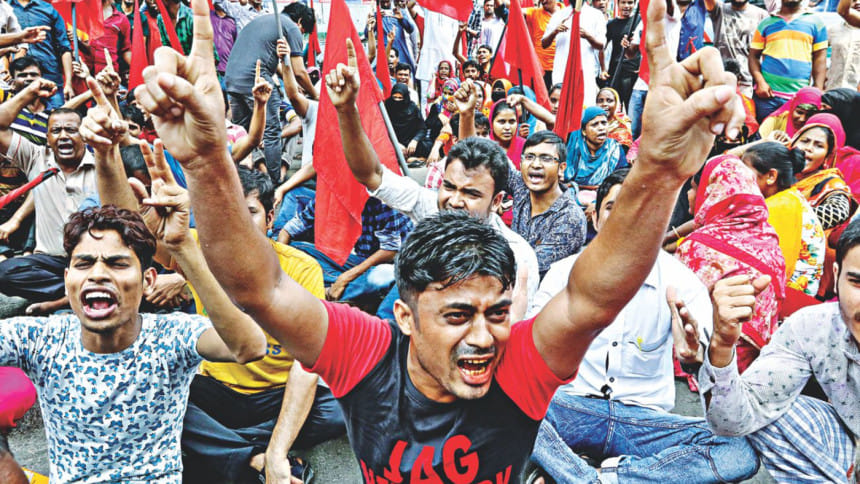Essential service ACT: Draft tugs at right to go on strike

The cabinet yesterday gave the nod to the draft of the Essential Service Act, 2022, including a clause that criminalises strikes in organisations whose services are declared essential -- in a development that stands to set back the country's labour rights.
The International Labour Organisation's principles identify the right to strike as an "intrinsic corollary of the right to organise" as recognised by the United Nations' Freedom of Association and Protection of the Right to Organise Convention. Bangladesh ratified the convention on June 22, 1972.
The maximum punishment for instigating an "illegal" strike, layoff and lockout is one-year imprisonment or a fine of Tk 50,000 or both, as per the draft, which was approved at a cabinet meeting chaired by Prime Minister Sheikh Hasina.
Essential services include post and telecommunication, internet, ICT, mobile financial service, digital financial services, power generation, supply and sales, gas, passengers and goods transportation by road, rail, air and waterways, terminals, customs and food procurement.
In addition, the government can declare any industry or service essential.
For example, if a strike is called at Chattogram Port and the government deems the activities there cannot be halted, it can declare the service essential, said Cabinet Secretary Khandker Anwarul Islam yesterday at a press briefing at the Secretariat.
"The government will declare some services 'essential'. In addition, if the people suffer, then the government can make these declarations on an emergency basis," he added.
The declarations will maintain the status quo for six months maximum at a time.
The draft incorporated provisions of the Essential Services (Maintenance) Act, 1952, and The Essential Services (Second) Ordinance, 1958, both of which are now in effect.
In addition to strikes, the draft law criminalises unlawful lay-offs and lockouts in organisations and industries deemed essential.
"There are 14 sections in the act. If the government thinks a lay-off, strike or lockout is not justified, it can declare these activities illegal," Islam said.
He maintained that the law would not contradict the Labour Act.
"There are certain provisions in the Labour Act that specify under what circumstances layoff can be declared," Islam added.
Currently, the labour law allows workers to go on strike if their employers fail to settle a dispute within a prescribed time.
The labour law states that strikes can be declared illegal if adequate notice is not provided to owners or employers or if there is an ongoing dispute resolution process.
However, the constitution guarantees the freedom of assembly and states that every citizen has the right to assemble and to participate in public meetings and processions peacefully and without arms, subject to any reasonable restrictions imposed by law in the interests of public order or public health.
The cabinet also approved the proposal to continue the ban on cutting trees in the country's reserved and natural forests until 2030 in a bid to protect biodiversity.
The current ban -- which does not include trees in social forests -- ends this year.
The cabinet also endorsed the draft of the National Adaptation Plan (2023-2030) to cope with the adversities of climate change and the draft of the Balumohal (sand quarry) and Soil Management (Amendment) Act 2022 to stop indiscriminate sand-lifting.
As per the draft, a sand quarry cannot be leased out for more than one year, Isla said, adding that the maximum punishment for a grievous offence is two years imprisonment, a fine of Tk 10 lakh or both.
At the cabinet meeting, the prime minister called upon the country's people to keep their houses and adjacent areas clean to prevent dengue.
The number of dengue patients in the country has reached nearly 36,000 this year so far.
Also at the meeting, it was decided that from November 15 all government and autonomous offices will remain open from 9 am to 4 pm.
On August 22, the cabinet rescheduled the office hours from 8 am to 3 pm to save electricity and reduce traffic congestion.

 For all latest news, follow The Daily Star's Google News channel.
For all latest news, follow The Daily Star's Google News channel. 








Comments